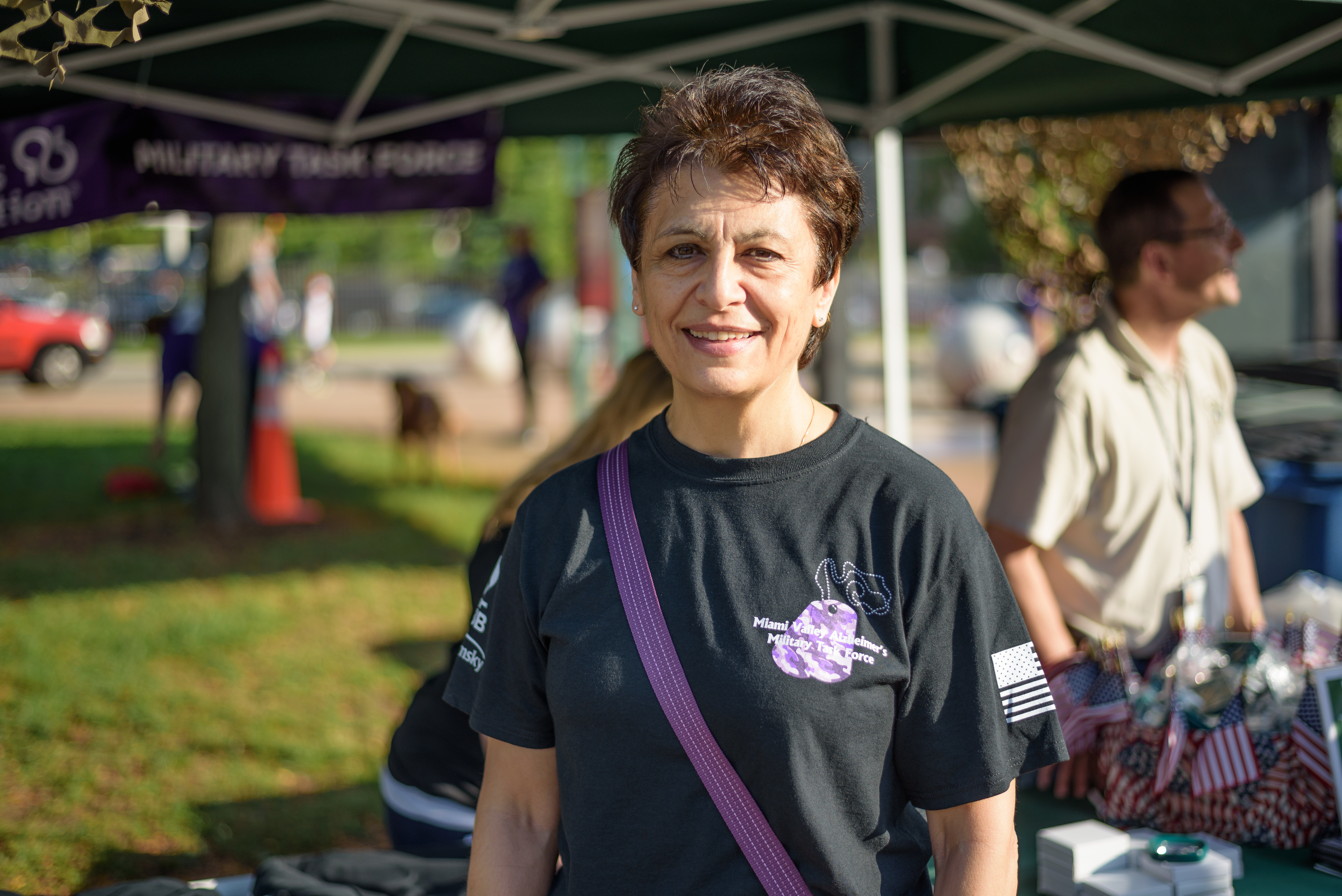Cassie B. Barlow, Retired Colonel of the United States Air Force, works tirelessly to help veterans in southwest Ohio connect to community services. She knows the military population well. She served 26 years in the Air Force, with her last assignment as the 88
th Air Base Wing and Installation Commander at Wright-Patterson Air Force Base near Dayton, Ohio.
She also knows veterans are at higher risk for Alzheimer’s disease. And as chair of an innovative Alzheimer’s Association Military Task Force, she leads a group of community volunteers to spread the word about dementia risks among the veterans’ population.
“I am trying to end the stigma around getting help,” said Barlow, who is also president of the Southwestern Ohio Council for Higher Education. “People go to the doctor for physical ailments, why not do the same for cognitive and memory issues,” she said.

Research shows that female veterans who suffer from depression, post-traumatic stress disorder and brain injury are at a higher risk of dementia because each significantly raises the odds of later dementia. In Ohio, efforts to identify veterans at risk of dementia and Alzheimer’s are intensifying.
Ohio has about 877,000 veterans, according to the Ohio Department of Veterans Services. But in the Dayton region, home to one of the United States Air Force’s largest installations -Wright Patterson -, there are 200,000 veterans. Half of the Dayton region’s veterans are over age 65 and 20 percent have a traumatic brain injury or post-traumatic stress disorder. Increasing age is the greatest risk factor for Alzheimer’s and other dementia. Those with a TBI or PTSD have a 60 percent greater chance of developing dementia.
That’s where the Military Task Force comes in. The Task Force is a unique partnership between the Alzheimer’s Association, Wright-Patterson and the Dayton VA Medical Center. The goal is to identify veterans with cognitive issues and connect them to the Alzheimer’s Association for education, care consultations and support. The Task Force also has a robust referral process for doctors to refer families to the Alzheimer’s Association after diagnosis for ongoing education and help.
The region is a great example of the need nationwide. Eric VanVlymen, Executive Director of the Alzheimer’s Association Miami Valley Chapter, said, “Our Military Task Force, whose members are either veterans themselves or they work with the veterans’ population, are uniquely positioned to carry the message that veterans are more likely to get Alzheimer’s or dementia and encourage their families to seek help. I really believe this model can be replicated around the state and around the nation. By building sustainable partnerships with our veterans’ organizations we can work together to reach more people.”
Through efforts of the Alzheimer’s Military Task Force, volunteers have delivered 35 educational programs and reached more than 2,600 community members. Task Force members have gone to local VFW halls and other places to meet with veterans’ groups, conducted training sessions for the VA, Ohio’s Hospice and Wright-Patterson physicians and trained county veterans’ services officers about the free dementia services available through the association.
Chelsea Jones, an Air Force veteran, said she saw a lot of mental health issues while she was in the military. She even experienced some herself, postpartum depression when she had her daughter in 2018. “It hit me like a ton of bricks,” Jones said.” A lot of women in the military end up dealing with it. Just talking to people helped.”
She said while active duty, she also saw a lot of alcohol use and abuse, which over the years can lead to cognitive impairment. Her grandfather, who is a veteran, currently has Alzheimer’s.
Today Jones works with veterans and active military members in the neuropsychology and substance abuse clinics are Wright-Patterson. “I feel like we have the tools for early detection. We need to start really putting the education out there,” she said.
To learn more about the Alzheimer’s Military Task Force, contact Cassie Barlow at cassie.barlow@soche.org
Alzheimer's Association
The Alzheimer's Association leads the way to end Alzheimer's and all other dementia — by accelerating global research, driving risk reduction and early detection, and maximizing quality care and support. Our vision is a world without Alzheimer's and all other dementia.™ For more information, visit www.alz.org or call the 24/7 Helpline at 800.272.3900.